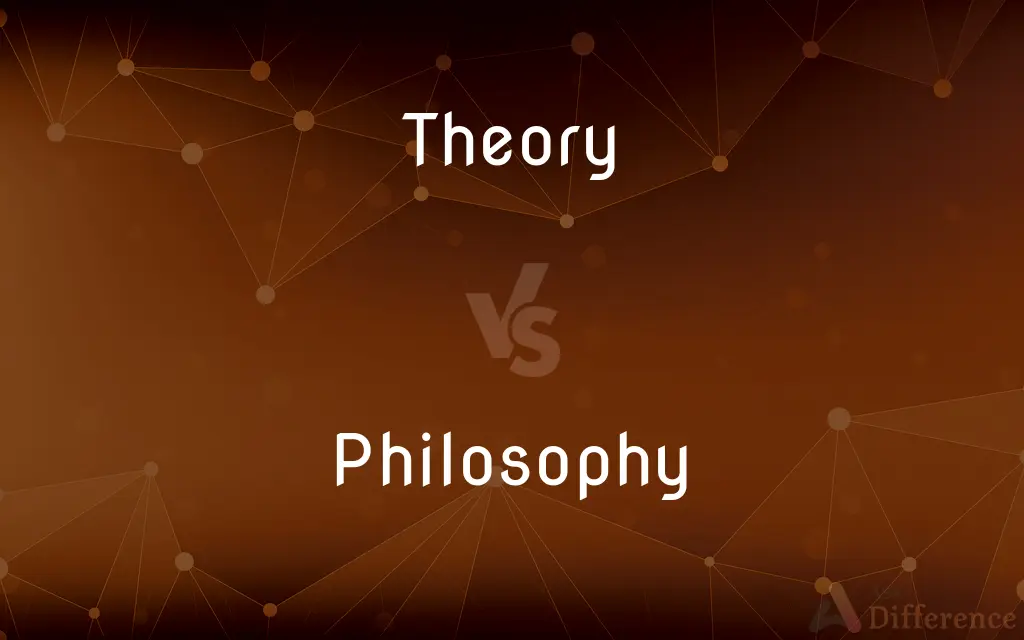Theory vs. Philosophy — What's the Difference?
Edited by Tayyaba Rehman — By Fiza Rafique — Updated on October 27, 2023
Theory is a system of ideas explaining something, while Philosophy is the study of fundamental nature of knowledge, reality, and existence.

Difference Between Theory and Philosophy
Table of Contents
ADVERTISEMENT
Key Differences
Theory and Philosophy are both crucial in understanding the world, but they serve distinct roles. A theory is a proposed explanation or model of the way one aspect of the world functions. On the other hand, Philosophy tackles broader questions about existence, knowledge, values, reason, and more.
While Theory tends to be more specific and is often supported by empirical evidence, Philosophy operates in realms where conclusive evidence may be elusive. Theory can be found in various sciences, aiming to predict outcomes, while Philosophy delves into abstract principles and foundational questions.
In many academic fields, Theory provides a framework to understand phenomena. It offers hypotheses that can be tested and refined. Conversely, Philosophy might not provide direct answers but rather equips us with the tools and methodologies to think critically and ask the right questions.
Although both Theory and Philosophy can guide action, their approaches differ. The former often looks for patterns and generalizations, making predictions based on data. In contrast, Philosophy examines the underlying principles and beliefs that shape actions and thoughts.
In essence, while Theory seeks to describe and predict, Philosophy aims to understand and interpret. Both are essential in their own right, complementing each other in the quest for knowledge.
ADVERTISEMENT
Comparison Chart
Nature
Specific explanation of a phenomenon.
Broad examination of existence, knowledge, and values.
Evidence
Often supported by empirical data.
May operate in areas where conclusive evidence is rare.
Application
Used in various sciences to predict outcomes.
Used to ponder abstract principles and foundational questions.
Purpose
Describe and predict.
Understand and interpret.
Basis
Often relies on patterns and generalizations.
Examines underlying principles and beliefs.
Compare with Definitions
Theory
A hypothesis that has gained wide acceptance.
Evolution is a widely accepted theory in biology.
Philosophy
The study of the fundamental nature of knowledge, reality, and existence.
His philosophy on life is to live in the moment.
Theory
A theory is a rational type of abstract thinking about a phenomenon, or the results of such thinking. The process of contemplative and rational thinking is often associated with such processes as observational study or research.
Philosophy
A particular system of beliefs, values, or principles.
Her philosophy of teaching emphasizes student engagement.
Theory
A set of statements or principles devised to explain a group of facts or phenomena, especially one that has been repeatedly tested or is widely accepted and can be used to make predictions about natural phenomena.
Philosophy
A theory or attitude held by a person or organization.
The company's philosophy is to put customers first.
Theory
The branch of a science or art consisting of its explanatory statements, accepted principles, and methods of analysis, as opposed to practice
A fine musician who had never studied theory.
Philosophy
Philosophy (from Greek: φιλοσοφία, philosophia, 'love of wisdom') is the study of general and fundamental questions, such as those about existence, reason, knowledge, values, mind, and language. Such questions are often posed as problems to be studied or resolved.
Theory
A set of theorems that constitute a systematic view of a branch of mathematics.
Philosophy
The study of the fundamental nature of knowledge, reality, and existence, especially when considered as an academic discipline.
Theory
Abstract reasoning; speculation
A decision based on experience rather than theory.
Philosophy
A theory or attitude that acts as a guiding principle for behaviour
Don't expect anything and you won't be disappointed, that's my philosophy
Theory
A belief or principle that guides action or assists comprehension or judgment
Staked out the house on the theory that criminals usually return to the scene of the crime.
Philosophy
The study of the nature, causes, or principles of reality, knowledge, or values, based on logical reasoning.
Theory
An assumption based on limited information or knowledge; a conjecture.
Philosophy
A system of thought based on or involving such study
The philosophy of Hume.
Theory
A description of an event or system that is considered to be accurate.
Philosophy
The study of the theoretical underpinnings of a particular field or discipline
The philosophy of history.
Theory
(sciences) A coherent statement or set of ideas that explains observed facts or phenomena and correctly predicts new facts or phenomena not previously observed, or which sets out the laws and principles of something known or observed; a hypothesis confirmed by observation, experiment etc.
Philosophy
An underlying theory or set of ideas relating to a particular field of activity or to life as a whole
An original philosophy of advertising.
An unusual philosophy of life.
Theory
(uncountable) The underlying principles or methods of a given technical skill, art etc., as opposed to its practice.
Philosophy
The love of wisdom.
Theory
(mathematics) A field of study attempting to exhaustively describe a particular class of constructs.
Knot theory classifies the mappings of a circle into 3-space.
Philosophy
(uncountable) An academic discipline that seeks truth through reasoning rather than empiricism.
Philosophy is often divided into five major branches: logic, metaphysics, epistemology, ethics and aesthetics.
Theory
A hypothesis or conjecture.
Philosophy
(countable) A comprehensive system of belief.
Theory
A set of axioms together with all statements derivable from them; or, a set of statements which are deductively closed. Equivalently, a formal language plus a set of axioms (from which can then be derived theorems). The statements may be required to all be bound (i.e., to have no free variables).
A theory is consistent if it has a model.
Philosophy
(countable) A view or outlook regarding fundamental principles underlying some domain.
A philosophy of government;
A philosophy of education
Theory
A doctrine, or scheme of things, which terminates in speculation or contemplation, without a view to practice; hypothesis; speculation.
Philosophy
(countable) A general principle (usually moral).
Theory
An exposition of the general or abstract principles of any science; as, the theory of music.
Philosophy
(archaic) A broader branch of (non-applied) science.
Theory
The science, as distinguished from the art; as, the theory and practice of medicine.
Philosophy
A calm and thoughtful demeanor; calmness of temper.
Theory
The philosophical explanation of phenomena, either physical or moral; as, Lavoisier's theory of combustion; Adam Smith's theory of moral sentiments.
Philosophy
Synonym of small pica.
Theory
A well-substantiated explanation of some aspect of the natural world; an organized system of accepted knowledge that applies in a variety of circumstances to explain a specific set of phenomena;
Theories can incorporate facts and laws and tested hypotheses
True in fact and theory
Philosophy
To philosophize.
Theory
A tentative theory about the natural world; a concept that is not yet verified but that if true would explain certain facts or phenomena;
A scientific hypothesis that survives experimental testing becomes a scientific theory
He proposed a fresh theory of alkalis that later was accepted in chemical practices
Philosophy
Literally, the love of, inducing the search after, wisdom; in actual usage, the knowledge of phenomena as explained by, and resolved into, causes and reasons, powers and laws.
Theory
A belief that can guide behavior;
The architect has a theory that more is less
They killed him on the theory that dead men tell no tales
Philosophy
A particular philosophical system or theory; the hypothesis by which particular phenomena are explained.
[Books] of Aristotle and his philosophie.
We shall in vain interpret their words by the notions of our philosophy and the doctrines in our school.
Theory
A system of ideas intended to explain something.
The Big Bang is a popular theory about the origin of the universe.
Philosophy
Practical wisdom; calmness of temper and judgment; equanimity; fortitude; stoicism; as, to meet misfortune with philosophy.
Then had he spent all his philosophy.
Theory
A set of principles on which an activity or process is based.
The theory of relativity reshaped our understanding of time and space.
Philosophy
Reasoning; argumentation.
Of good and evil much they argued then, . . . Vain wisdom all, and false philosophy.
Theory
An abstract thought or speculation.
It's just a theory, but I think he's been avoiding us.
Philosophy
The course of sciences read in the schools.
Theory
The general principles of a subject.
She has a solid grounding in music theory.
Philosophy
A treatise on philosophy.
Philosophy
A belief (or system of beliefs) accepted as authoritative by some group or school
Philosophy
The rational investigation of questions about existence and knowledge and ethics
Philosophy
Any personal belief about how to live or how to deal with a situation;
Self-indulgence was his only philosophy
My father's philosophy of child-rearing was to let mother do it
Philosophy
The study of the theoretical basis of a branch of knowledge or experience.
The philosophy of science questions the very nature of reality.
Philosophy
A personal outlook or viewpoint.
His philosophy is that you should always give people a second chance.
Common Curiosities
Can a Theory be proven?
Theories can be supported by evidence, but they're open to revision or refutation as new evidence emerges.
What is a Theory?
A theory is a system of ideas intended to explain something, often based on principles and evidence.
Are all Theories scientific?
No, while many theories are scientific, there are theories in other fields like arts and humanities.
How do Theories differ from hypotheses?
Hypotheses are testable predictions, while theories are broader explanations that are supported by a body of evidence.
What is Philosophy?
Philosophy is the study of the fundamental nature of knowledge, reality, and existence.
Why is Philosophy important?
Philosophy helps us think critically, question assumptions, and understand our values and beliefs.
Can Theories evolve over time?
Absolutely, as new evidence is gathered, theories can change or be replaced.
Do Philosophers propose Theories?
Yes, philosophers can propose theories, especially in areas like ethics, epistemology, and metaphysics.
Is Philosophy purely theoretical?
While much of philosophy is theoretical, it can have practical implications and guide behavior.
Can one study Philosophy scientifically?
While philosophy uses different methods, it can intersect with and inform scientific inquiry.
Share Your Discovery

Previous Comparison
Shrub vs. Brush
Next Comparison
Polypropylene vs. PolyethyleneAuthor Spotlight
Written by
Fiza RafiqueFiza Rafique is a skilled content writer at AskDifference.com, where she meticulously refines and enhances written pieces. Drawing from her vast editorial expertise, Fiza ensures clarity, accuracy, and precision in every article. Passionate about language, she continually seeks to elevate the quality of content for readers worldwide.
Edited by
Tayyaba RehmanTayyaba Rehman is a distinguished writer, currently serving as a primary contributor to askdifference.com. As a researcher in semantics and etymology, Tayyaba's passion for the complexity of languages and their distinctions has found a perfect home on the platform. Tayyaba delves into the intricacies of language, distinguishing between commonly confused words and phrases, thereby providing clarity for readers worldwide.














































